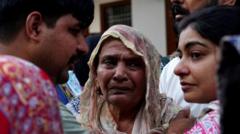A recent report from the Global Terrorism Index highlights the Sahel region as the "epicentre of global terrorism," with 3,885 deaths in this area alone, drastically increasing from previous years. Weak governance, political upheaval, and economic unrest contribute to the growth of jihadist groups in the region, raising concerns of an expanding threat beyond its borders.
Sahel Region Sees Alarming Rise in Terrorism-Related Deaths

Sahel Region Sees Alarming Rise in Terrorism-Related Deaths
The Sahel region has emerged as a hotspot for terrorism, accounting for over half of global terrorism-related deaths amidst a significant rise in extremist activities.
The Sahel region of Africa has become a focal point for global terrorism, according to the latest findings from the Global Terrorism Index (GTI). The report states that for the first time, this semi-arid area, which stretches south of the Sahara Desert, accounts for more than half of all terrorism-related deaths globally. The index cites 3,885 fatalities in the Sahel out of a total of 7,555 deaths worldwide.
Despite a decline in global terrorism deaths from a peak of 11,000 in 2015, the Sahel has experienced a nearly tenfold increase since 2019. This alarming rise is attributed to the shift in focus of extremist organizations toward the region. Published by the Institute for Economics and Peace, the GTI report defines terrorism as the use of illegal force and violence by non-state actors to achieve political, economic, religious, or social objectives through intimidation or coercion.
The Sahel encompasses parts of ten countries, including Burkina Faso, Mali, Niger, Cameroon, and Nigeria. With some of the world's highest birth rates and a youthful population—about two-thirds of its inhabitants are under 25—these demographic factors exacerbate existing tensions. The report emphasizes a stark difference between the rise of "lone actor terrorism" in the West and the rapid expansion of jihadist groups in the Sahel.
Most attacks in the region have been attributed to two dominant organizations: the Islamic State's affiliate in the Sahel and Jama'at Nusrat al-Islam wal Muslimeen (JNIM), a faction of al-Qaeda. According to Niagalé Bagayoko, chair of the African Security Sector Network, these groups are competing to establish their legal frameworks based on Sharia law while striving for territorial control.
A UN panel of experts noted that IS-Sahel has significantly increased its territory in Mali and both insurgent groups are recruiting more fighters, including children. The challenges facing communities often leave individuals with little choice but to join militant groups. Beverly Ochieng, a senior analyst at Control Risks, highlights how political instability and weak governance create ideal conditions for insurgent growth, seeing conflict as a primary driver of terrorism.
The Sahel, often termed the "coup belt" of Africa, has witnessed numerous successful coups since 2020. Notably, Burkina Faso has remained the most affected country by terrorism for two consecutive years, uniquely holding this distinction apart from Iraq and Afghanistan.
Financially, jihadist groups sustain their operations through various illicit activities, such as kidnapping for ransom and cattle rustling, with drug trafficking also being a lucrative source of income. The GTI report notes that some insurgents have developed models that incorporate tax collection or the provision of security services, enhancing their integration into local communities and solidifying their influence.
Following recent coups, Sahel governments have refocused their alliances from Western nations like the United States and France to countries like China and Russia for assistance in combating terrorism. Although Russian paramilitaries are engaging with local militaries, the effectiveness of this strategy remains in question.
The GTI raises alarms regarding potential spillover effects, suggesting that the terrorism experienced in the Sahel could soon extend to neighboring countries. Togo, which has already recorded unprecedented attacks and deaths, may represent a troubling trend of growing instability spreading to coastal West African nations.
In summary, the Sahel region is facing a multifaceted crisis characterized by increased terrorism, political instability, and socio-economic challenges that threaten both local populations and broader regional stability.





















